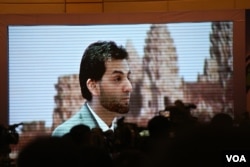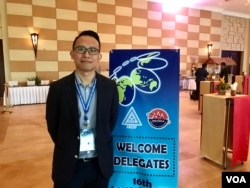Attendees at an Asian media conference agreed to develop a regional road map for combating fake news throughout the region, which is in the midst of government press crackdowns in several countries, including the host nation.
The two-day summit, titled “Media Digitalization: Focusing on Developing Markets”, was organized by the Malaysia-based Asia-Pacific Institute for Broadcasting Development, or AIBD. The group is a regional inter-governmental organization funded by over a hundred state and non-state members, and funded primarily by the host, Cambodia’s Ministry of Information.
“The summit and pre-summit workshops have addressed concerns caused by digital media, which requires relevant authorities to make regulations to anti-cybercrimes, fake news, and training people to raise awareness and enhance the media profession,” said Khieu Kanharith, Cambodia’s minister of information, in closing remarks Thursday.
Attendees agreed to launch the “Angkor Fake News Initiative,” to be followed by meetings to discuss an “Asia-Pacific road map to combat fake news,” he said.
The Minister said “fake news” is a “global concern” which all nations must combat. But Cambodia’s efforts against “fake news” has have raised concerns for media experts that it could be a tool to silence critics.
What is 'fake news'?
In early 2018, Cambodian Prime Minister Hun Sen echoed US President Trump’s criticism of the New York Times, when he said the paper was given a “fake news” award. He added that if a Times journalist who was in the crowd covering his Mekong bridge ceremony reported wrongly about him, “the Cambodian people will remember your faces.”
Nop Vy, media director of the Cambodian Center for Independent Media in Cambodia, said he is concerned that “the actions against fake news can impact the freedom of expression and online activities.”
Meas Sophorn, spokesman for Cambodia’s Ministry of Information, denied that the government’s new regional efforts to fight fake news will impact freedom of expression. While he did not say whether regional governments have a common definition of what constitutes “fake news”, he said from his understanding, the term includes poor journalism.
He said the new fake news research initiative, which is led by UNESCO and AIBD with regional governments, will spend one year researching the social impact of fake news before deciding what to do with the result.
Leang Delux, a journalist and CEO of online news site ThmeyThmey, said he is unaware of any agreed definition of ‘fake news’ in Cambodia but emphasized that from his understanding, fake news has to involve “intention” to falsify.
He said as an independent news organization, he would welcome any opportunity to give input as a stakeholder should the government be drafting any fake news law. Minister of Information Khieu Kanharith, talking to VOA Khmer at the conference, has so far denied such laws as rumors.
Prior to the gathering, Human Rights Watch had urged UNESCO to call for the restoration of press freedom in Cambodia. The Cambodian government has been restricting the press since the run-up to the July 2018 election.
UNESCO did not take a stand against the government of Prime Minister Hun Sen, which has closed media outlets and jailed journalists in an effort to silence the opposition’s voice in what Human Rights Watch described as a once “vibrant press.”
During opening remarks, the UNESCO representative to Cambodia, Sardar Umar Alam, said his organization “works together with different partners from journalism, media organizations, academia, civil society and national authorities to help strengthen freedom of expression, press freedom and safety of journalists in a free, independent and pluralistic media landscape.”
But experts raised questions in a region where governments are restricting the press and how journalists can exercise their reporting freely.
Ahead of last year’s general elections, Hun Sen’s government banned the main opposition party and launched a crackdown on civil society and media that led to the closure or take-over of most independent newspapers and radio stations, including the Cambodia Daily newspaper and Radio Free Asia’s Phnom Penh bureau. Dozens of Khmer-language radio stations that carried news reports critical of the government were also silenced.
A number of RFA journalists have lost their jobs and some journalists are concerned about their safety.
“It’s outrageous that these UNESCO bureaucrats are soft-pedaling such an important part of UNESCO’s mandate while honoring Hun Sen, the dictator who oversaw the destruction of just about every independent media outlet in Cambodia, to open the conference,” said Phil Robertson, deputy Asia director of Human Rights Watch in an email.
Sarda Umar Alam could not be reached for comments.
Free speech, but no free press
“Conference organizer ABID should be ashamed of its role in empowering governments like Cambodia, Laos, Vietnam, and Myanmar who have done everything in their power to block press freedom and keep their people awash in government propaganda masquerading as ‘news,” Phil Robertson said.
But Ming-Kuok Lim, advisor for communication and information for UNESCO’s regional office in Jakarta, who attended the Cambodia summit, told VOA Khmer that a technical conference like the Asia Media Summit may not be the best venue to raise specific concerns about press freedom.
The UNESCO official further said that as a neutral ‘honest broker’, they continue to “engage” and “keep the dialogue open” with its members like Cambodia and push for international standards for human rights, which includes press freedom.
“Sometimes we discuss very sensitive issues. Sometimes we discuss things which [cannot] simply be resolved in one conference. There is a limit to what one single conference can do,” Lim said adding that, “the idea is to continue this engagement to involve different parties in the dialogue.”
Many countries in Southeast Asia have seen press freedoms erode, including online freedom, with the Philippines serving as prominent example. The only bright spot, Malaysia, had drafted a fake news law but changed course following government change.
In his remarks to open the conference on Wednesday, Hun Sen called for action to combat fake news. The Cambodian leader explained that this is to “avoid disseminating fake news, insulting, inciting for discrimination, hate speech, causing hostility, anger, which leads to racial controversy and news exaggeration and makes the problem become more worse.”
Hun Sen’s government has now drafted a new anti-cybercrime law, raising concerns that it will affect freedom of expression as the country has taken aim at critics who post on Facebook.
Several large newspapers and TV stations owned by investors linked to Hun Sen's ruling Cambodian People’s Party dominate the local language media and television channels.
Nop Vy, director of the Cambodian Center for Independent Media, said: “If the issue of [declining] press freedom and freedom of expression was raised, it would have affected Cambodia’s image during the summit.”
He said journalists from his Voice of Democracy were not invited to the summit as many of VOD’s partner stations were taken off the air by the government in August 2017, along with stations broadcasting VOA and Radio Free Asia programs.
“There has been a great loss of critical coverage since the crackdown and Cambodian journalists are afraid of reporting critical stories and some have left their journalism careers,” he added.
During a concluding press conference, AIBD president Fayyaz Shehryar, rejected Human Rights Watch’s claim that Cambodia was an inappropriate venue.
“The very fact that Cambodia has wholeheartedly hosted and allowed us to be here for this important summit dispenses the notion of Human Rights Watch that Cambodia does not have intention to free the press or let it work with complete or absolute freedom.”
In a separate interview afterward, however, Shehryar said that host countries like Cambodia have significant input into the content and level of openness of the annual conference and this year’s organizers did not see value in discussion of sensitive topics, such as happened at last year's conference.
“They [sensitive topics] were discussed but in India we have a free media.” he said. “Each country takes its own call,” he added.
Cambodia’s media was “once among the freest in Asia,” said Reporters Without Borders, noting that the country’s ranking dropped from 71st in its Press Freedom Index in 2002 to 142 out of 180 countries in 2018.





